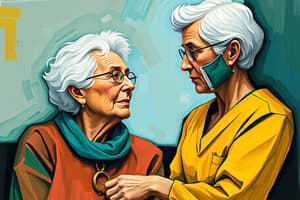Podcast
Questions and Answers
What is gerontological nursing?
What is gerontological nursing?
A nursing sub-specialty for older patients that involves health and functional status, planning and implementing health care, and evaluating its effectiveness.
Which of the following factors influence attitudes towards the aged? (Select all that apply)
Which of the following factors influence attitudes towards the aged? (Select all that apply)
- Economic Status
- Gender (correct)
- Educational Background (correct)
- Age (correct)
- Living with an older person (correct)
Gerontological nursing focuses solely on medical care.
Gerontological nursing focuses solely on medical care.
False (B)
The only woman to participate in the WHO Committee on Aging and Geriatric Care was _____ McIver.
The only woman to participate in the WHO Committee on Aging and Geriatric Care was _____ McIver.
What does the scope of gerontological nursing practice include?
What does the scope of gerontological nursing practice include?
Which of the following is NOT a standard of gerontological nursing practice?
Which of the following is NOT a standard of gerontological nursing practice?
What is one effect of aging on the physiological health of older adults?
What is one effect of aging on the physiological health of older adults?
Doris Schwartz wrote about the lack of clinical research in tying up patients and its _____ effect.
Doris Schwartz wrote about the lack of clinical research in tying up patients and its _____ effect.
Match the following nursing leaders with their contributions:
Match the following nursing leaders with their contributions:
What is the nursing sub-specialty for older patients called?
What is the nursing sub-specialty for older patients called?
Which factor does NOT influence attitudes toward the aged?
Which factor does NOT influence attitudes toward the aged?
Gerontological nursing is the same as geriatric nursing.
Gerontological nursing is the same as geriatric nursing.
Who introduced physical and social activities to enhance the lives of older adults?
Who introduced physical and social activities to enhance the lives of older adults?
What are the key components of the standards of gerontological nursing practice?
What are the key components of the standards of gerontological nursing practice?
Education is optional for nurses after graduation.
Education is optional for nurses after graduation.
The only woman to participate in the WHO Committee on Aging and Geriatric Care was _____ McIver.
The only woman to participate in the WHO Committee on Aging and Geriatric Care was _____ McIver.
Match the following leaders with their notable contributions:
Match the following leaders with their notable contributions:
Flashcards are hidden until you start studying
Study Notes
Introduction to Gerontological Nursing
- Gerontological nursing, previously known as "geriatrics," focuses on older adults' health and functional status.
- Involves planning, implementing, and evaluating healthcare services tailored to older adults’ identified needs.
- Emphasizes rehabilitation and the necessity for ongoing research in the field.
Pioneers in Gerontological Nursing
-
VERA MCIVER
- Advocated for physical and social activities to improve the lives of older individuals.
-
DORIS SCHWARTZ
- First woman on the WHO Committee on Aging and Geriatric Care (1965, Geneva).
- Raised awareness in the early 1980s about the shortage of clinical research impacting patient care.
-
MARY OPAL WOLANIN
- Authored "Confusion: Prevention and Care."
- Recognized as Gerontologic Nurse of the Year in 1982.
Factors Influencing Attitudes Toward Aging
- Age, gender, educational background, and personal experience with older adults significantly shape perceptions about aging.
Comparison: Gerontological Nursing vs. Geriatric Nursing
- Gerontological Nursing focuses on the aging process and holistic care for older adults.
- Geriatric Nursing centers on treating acute and chronic illnesses prevalent among the elderly.
Scope and Standards of Gerontological Nursing Practice
-
Scope Areas:
- Assessment
- Diagnosis
- Outcome Identification
- Planning
- Implementation
- Evaluation
-
Standards:
- Quality of Care, ensuring effective, safe, and people-centered health services.
- Performance Appraisals for evaluating nursing effectiveness.
- Continuous Education, encouraging ongoing professional development.
Aging Process Overview
-
Biological Changes:
- Decrease in bone and muscle mass.
- Respiratory efficiency declines; lung function decreases.
- Cardiovascular and renal systems show decline.
- Reduction in brain cells and brain mass, impacting cognitive functions.
- Vision and hearing deteriorate with age.
-
Physiological Changes:
- Slower cell turnover and loss of mucous membrane function.
- Cachexia, characterized by significant muscle loss.
- Mild cerebral atrophy, leading to memory loss and difficulty in communication.
-
Psychological Changes:
- Increased mental and emotional disorders, such as dementia.
- Cognitive decline affects learning and memory capabilities.
Standards of Quality Care in Gerontological Nursing
- Effective care: Avoidance of treatment overuse or underuse.
- Safe care: Ensuring no harm comes to patients.
- People-centered care: Respecting and integrating patients' values and beliefs into their care plans.
Introduction to Gerontological Nursing
- Gerontological nursing, previously known as "geriatrics," focuses on older adults' health and functional status.
- Involves planning, implementing, and evaluating healthcare services tailored to older adults’ identified needs.
- Emphasizes rehabilitation and the necessity for ongoing research in the field.
Pioneers in Gerontological Nursing
-
VERA MCIVER
- Advocated for physical and social activities to improve the lives of older individuals.
-
DORIS SCHWARTZ
- First woman on the WHO Committee on Aging and Geriatric Care (1965, Geneva).
- Raised awareness in the early 1980s about the shortage of clinical research impacting patient care.
-
MARY OPAL WOLANIN
- Authored "Confusion: Prevention and Care."
- Recognized as Gerontologic Nurse of the Year in 1982.
Factors Influencing Attitudes Toward Aging
- Age, gender, educational background, and personal experience with older adults significantly shape perceptions about aging.
Comparison: Gerontological Nursing vs. Geriatric Nursing
- Gerontological Nursing focuses on the aging process and holistic care for older adults.
- Geriatric Nursing centers on treating acute and chronic illnesses prevalent among the elderly.
Scope and Standards of Gerontological Nursing Practice
-
Scope Areas:
- Assessment
- Diagnosis
- Outcome Identification
- Planning
- Implementation
- Evaluation
-
Standards:
- Quality of Care, ensuring effective, safe, and people-centered health services.
- Performance Appraisals for evaluating nursing effectiveness.
- Continuous Education, encouraging ongoing professional development.
Aging Process Overview
-
Biological Changes:
- Decrease in bone and muscle mass.
- Respiratory efficiency declines; lung function decreases.
- Cardiovascular and renal systems show decline.
- Reduction in brain cells and brain mass, impacting cognitive functions.
- Vision and hearing deteriorate with age.
-
Physiological Changes:
- Slower cell turnover and loss of mucous membrane function.
- Cachexia, characterized by significant muscle loss.
- Mild cerebral atrophy, leading to memory loss and difficulty in communication.
-
Psychological Changes:
- Increased mental and emotional disorders, such as dementia.
- Cognitive decline affects learning and memory capabilities.
Standards of Quality Care in Gerontological Nursing
- Effective care: Avoidance of treatment overuse or underuse.
- Safe care: Ensuring no harm comes to patients.
- People-centered care: Respecting and integrating patients' values and beliefs into their care plans.
Studying That Suits You
Use AI to generate personalized quizzes and flashcards to suit your learning preferences.




